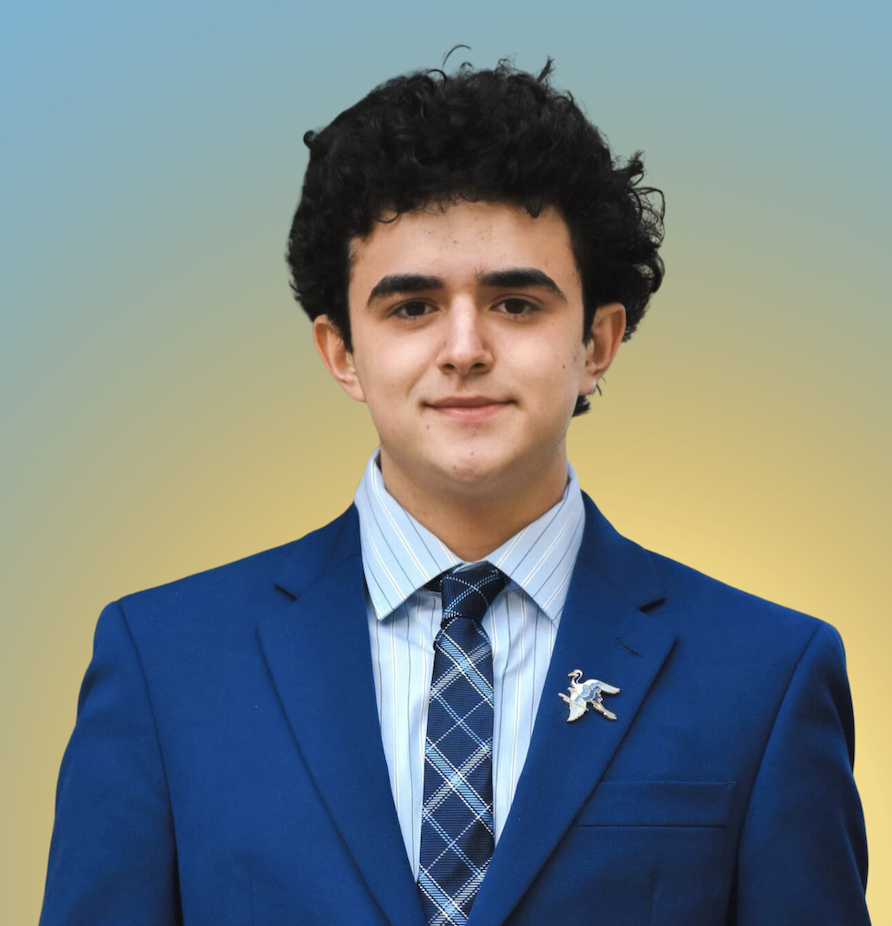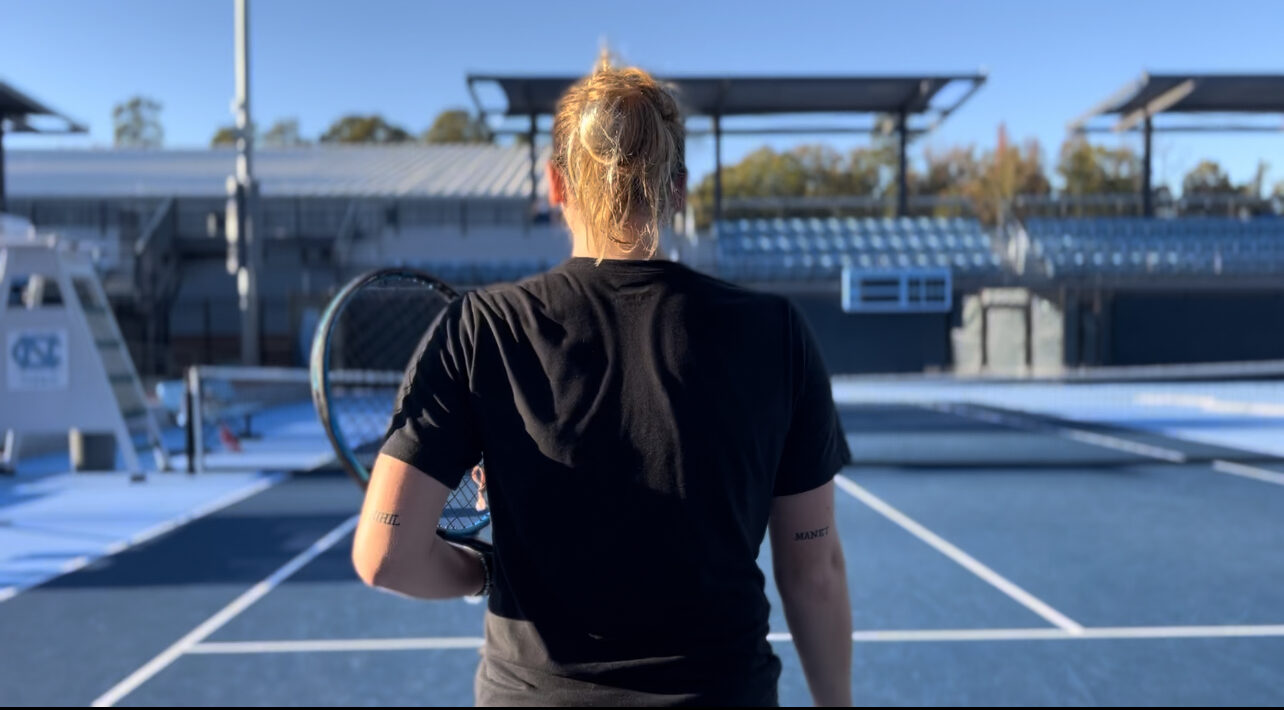
PLAYING TO SURVIVE:
STUDENT ATHLETES VS MENTAL HEALTH
Written by Adolfo Alvarez
December 12, 2023
When the NCAA revoked Reese Brantmeier’s eligibility in 2022, stripping one of the top tennis players at the University of North Carolina at Chapel Hill of her collegiate-level athletics, she felt like her identity was taken away. Enduring a 6-month period of ineligibility, Reese confronted challenges in her personal and academic life—areas she hadn’t explored much before—while striving to discover who she was beyond the tennis court as she was forced to seek peace in the middle of the toughest situation in her career.
Reese Brantmeier: A World-Ranked Tennis Player
Born in Whitewater, Wisconsin, Reese Brantmeier is an American tennis player at UNC-Chapel Hill. Her tennis career started at the young age of 8, and since then, Reese has been able to compete in some of the world’s most prestigious tournaments. She won the 2019 United States 16s national title, and at the 2022 US Open, she received a wildcard to the women’s doubles tournament.
She was offered the chance to play for the Carolina Tar Heels under a full-ride athletic scholarship, giving her the opportunity to join the first team in her entire career since she had always been a solo player. Still, she was excited to take a fresh path and join collegiate athletics at a top institution like UNC.
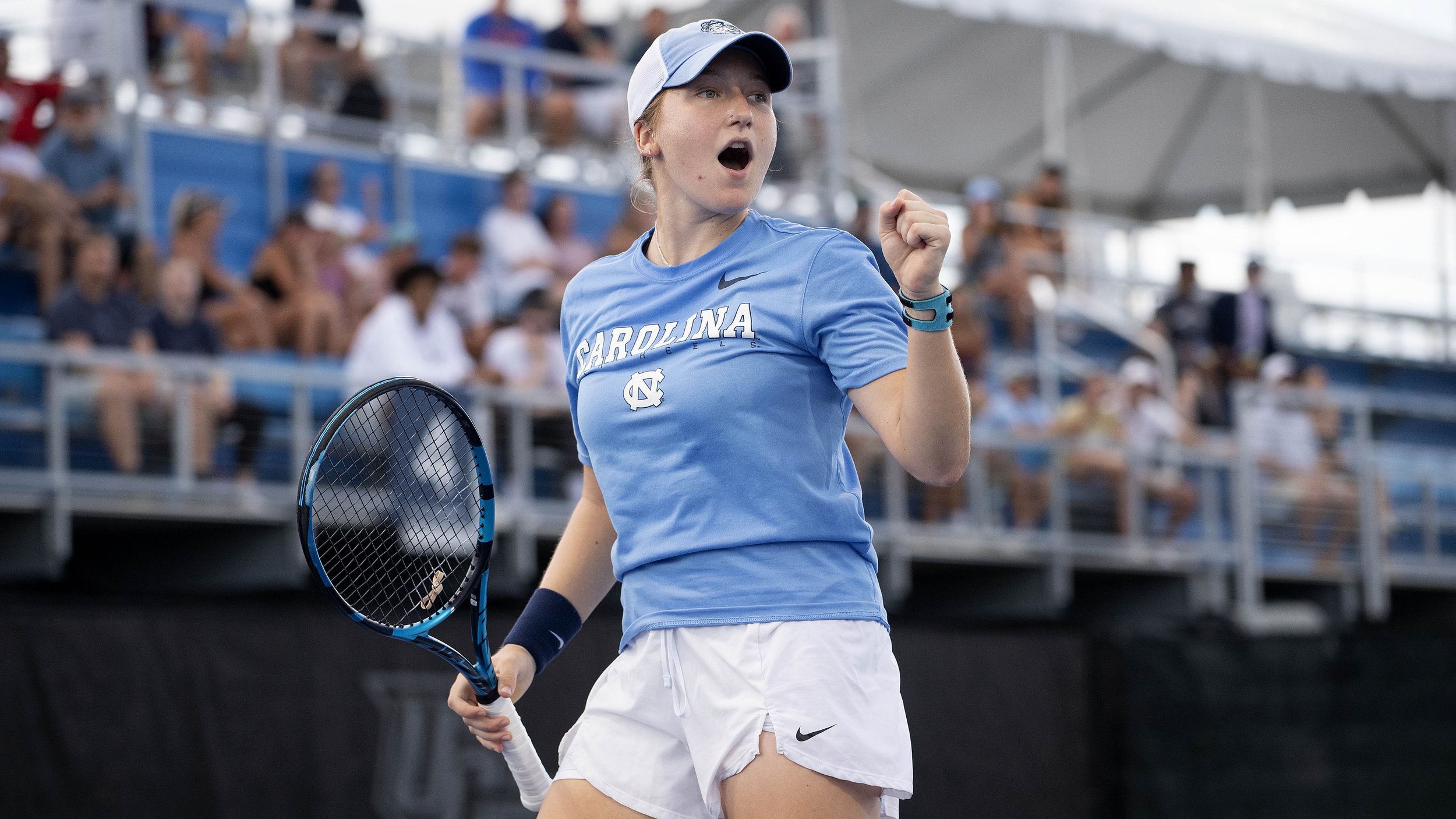
Reese is a compassionate and loving leader within the tennis community, which is evident by the Reese Brantmeier Project, an ambitious initiative with the goal of rejuvenating the local courts where her remarkable career began back in Whitewater.
The NCAA: A Decision that Froze A Career
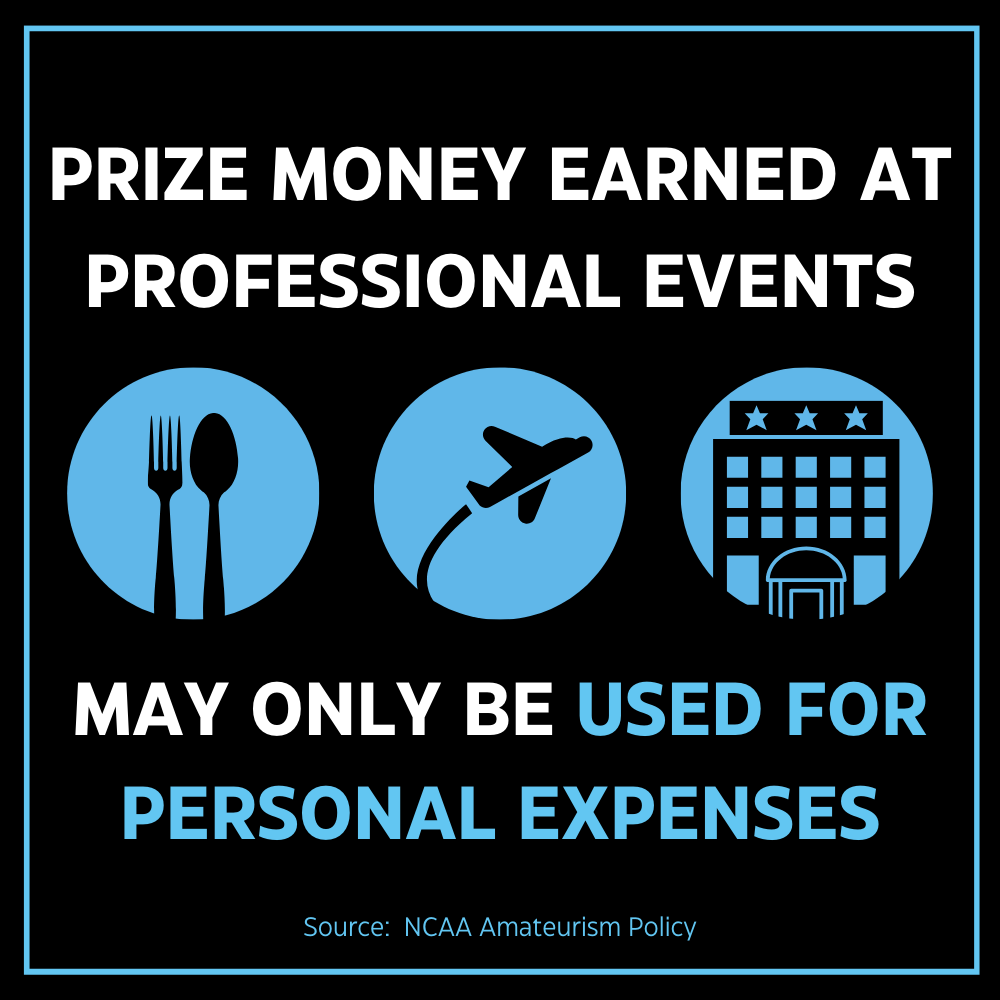
The NCAA enforces an Amateurism Policy with stringent rules dictating how student-athletes can earn and utilize prize money prior to college enrollment. According to an exception made to the policy in 2012, prize money may not exceed actual and necessary expenses and may be provided only by the sponsor of the event.1
Despite Reese’s commitment to the NCAA spending guidelines during her participation in professional events, her situation took a sudden turn. As she prepared to begin her first semester at Carolina in August of 2022, the NCAA flagged her case and suspended her eligibility under the assumption that she had broken this policy and misused the prize money she once earned.
Following this decision, Reese was compelled to begin her collegiate journey without the opportunity to pursue what had been the focus of her entire life. This left her without a clear purpose and motivation, forcing her to rely on a sense of hope that the NCAA investigation would clear her case and that she would be able to regain her chance to be on the tennis court soon.
As she describes, her transition to college was certainly harder as she spent most of her junior career invested in tennis, and all her courses were offered remotely in high school. This situation gave her the chance to come back into the classrooms with more energy and time. However, despite her positive efforts, not being able to join her team’s practices for months took a toll on her mental health:
It was really, really sad. It felt really isolating not to be able to play, and tennis is the one consistency that I’ve had in my life since I started playing, so having that taken away from me was really frustrating.
Reese Brantmeier, 2023
It was not until Reese’s second semester at the University in January 2023 that the NCAA notified her coaches that she was finally cleared to play without providing any explanation as to why the review was extremely delayed. Although Reese was able to return to the tennis court, the truth is that situations like these raise even more concerns about the extent to which exhausting collegiate athletic programs and strict regulations enforced by the NCAA can affect students and their personal lives beyond their sport.
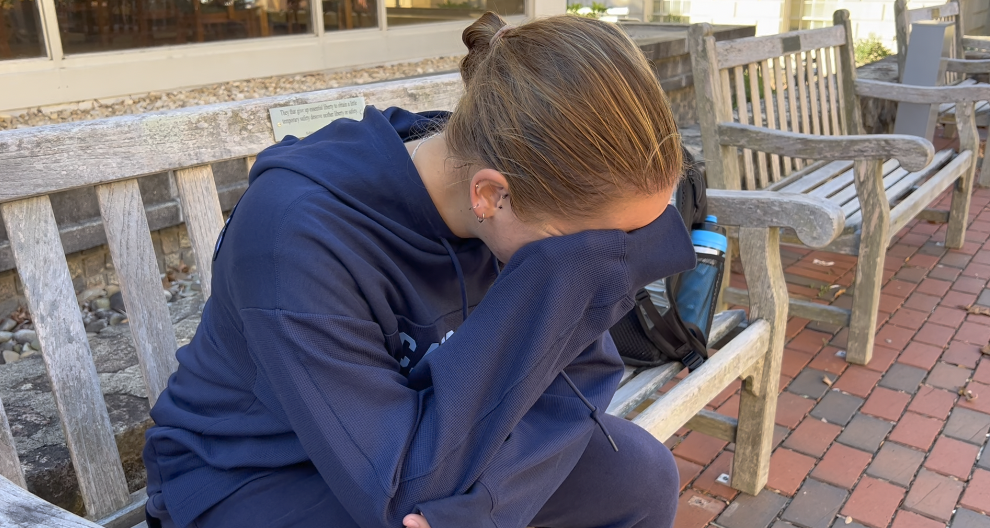
A CLOSER LOOK INTO THE ISSUE:
MENTAL HEALTH
It’s Not “Just A Few”: They Are Dying in a Crisis
There are over 500,000 student-athletes in the United States, and according to a study conducted by the NCAA, approximately 30% of student-athletes self-reported that they had experienced mental health difficulties, with nearly 25% feeling mentally exhausted.2 In 2022, 5 students who were high-achieving athletes died by suicide in less than a two-month period.3 These statistics underscore the severity of the crisis and the urgent need for intervention,.
BUT WHY? The causes of this crisis are complex. Student-athletes are expected to perform at a high level both academically and athletically, which often leads to mental burnout, anxiety, and depression. In addition, the COVID-19 pandemic further accelerated these issues, with rates of mental health concerns remaining at an all-time high since its breakout in 2020.4 Despite this broader context, Reese’s case exemplifies how unforeseen factors can impact each student uniquely, adding an extra layer of difficulty to addressing the issue.
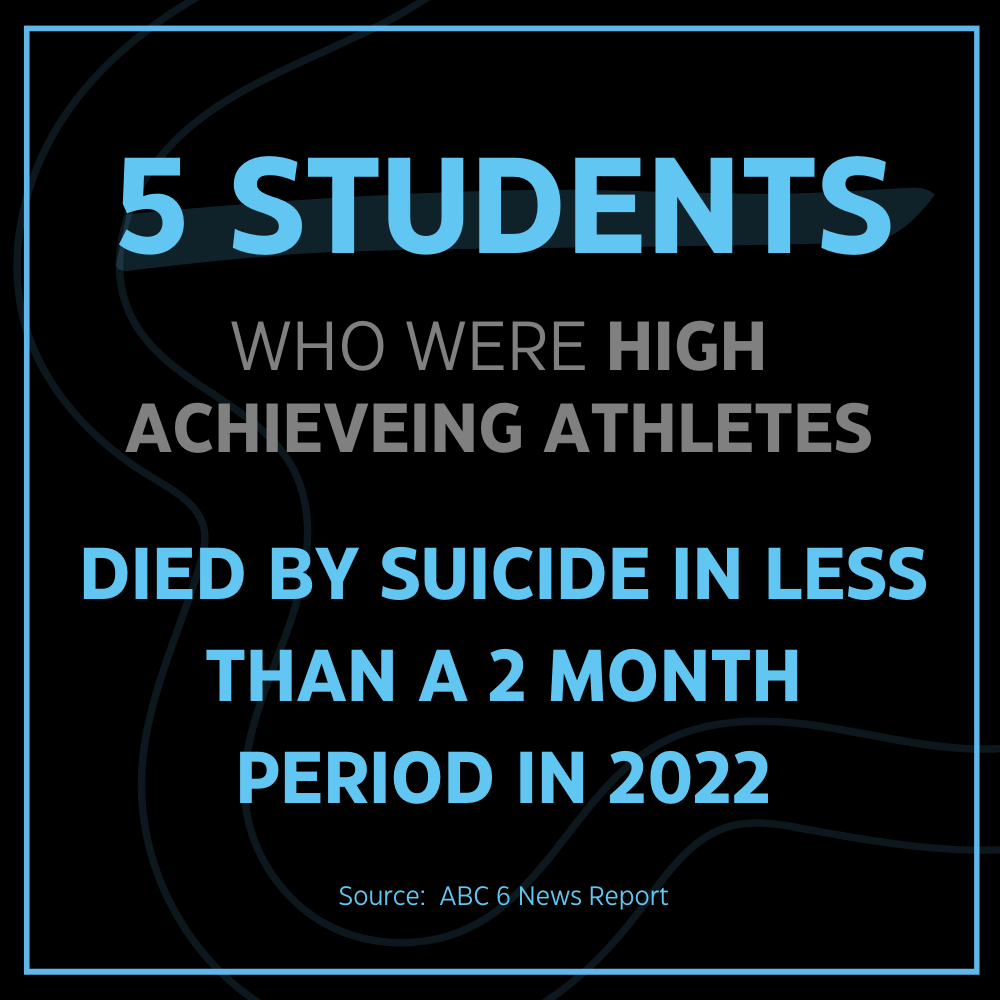
Although it is common for college students to feel overwhelmed with their class load, studies clearly show that signs of depression are higher in student-athletes. It is urgent for stakeholders to implement tangible changes in the current athletic system, as it falls short in safeguarding the mental health of its students, tragically leading to lives being lost.
So, What Can We Do About It?
Despite the growing crisis, according to the NCAA, less than half of women’s sports and men’s sports participants feel comfortable seeking support from a mental health provider on campus.5 However, some institutions have identified the root of the issue and implemented innovative solutions to help students cope with the challenges in their daily lives. UC Irvine has implemented two annual curricular athlete programs, Beyond Happy Faces and Step Up!, focusing on mental health support and teamwork techniques.6 The University of Mary Washington, through Eagles Let’s Talk, features monthly discussions led by licensed professionals as a space for students to share and get collective support for their concerns.7
It is the responsibility of administrative boards in each institution to coordinate substantial efforts to design effective programs that provide support resources for student-athletes, not as a “treatment” for mental health, but instead, as a measure to prevent students from falling unsupported and facing more severe consequences from their daily struggles. Here are some tips for stakeholders to make tangible changes while designing programs to support the well-being of student-athletes:
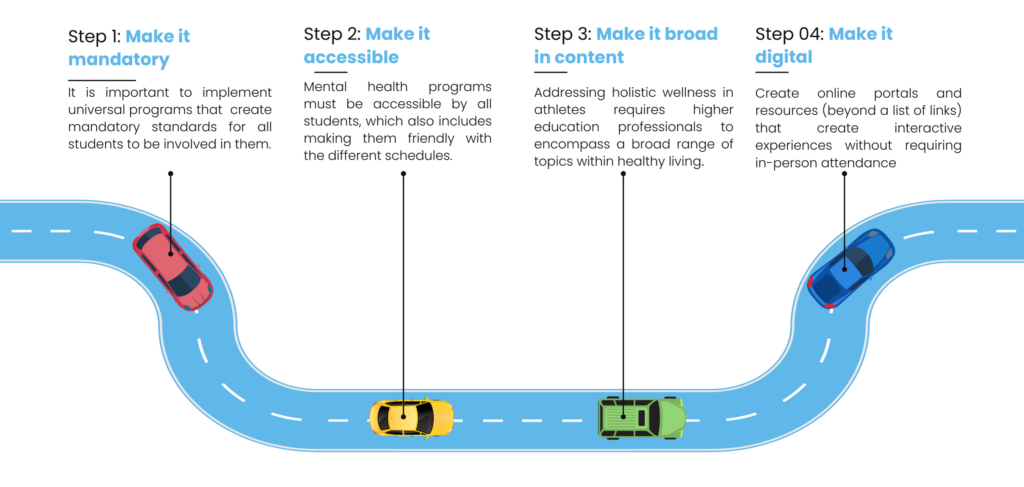
Why is This Story Relevant?
Reese’s story is a representation of the many struggles that student-athletes face in their daily lives that often go unnoticed. “Finding a New Identity” serves as an inspiring account, demonstrating how students, regardless of their background, can navigate situations where unforeseen factors disrupt their expectations and plans. Reese is not only a talented, world-ranked tennis player, but she is also a resilient person who has had to connect with herself even in the toughest circumstances while her positivity, optimism, and confidence guided her through a path of uncertainty and mental health challenges. This story aims to shed light on hardships often overlooked by the public, preventing many students nationwide from reaching their full potential in spirit, mind, and body.
Bibliography
- https://www.ncsasports.org/ncaa-eligibility-center/amateurism-rules ↩︎
- https://www.ncaa.org/sports/2013/11/20/ncaa-goals-study.aspx ↩︎
- https://abc6onyourside.com/news/local/five-college-athletes-die-by-suicide-since-march-columbus-experts-address-mental-health ↩︎
- https://www.ncaa.org/news/2023/5/4/media-center-college-sports-not-immune-to-mental-health-challenges.aspx ↩︎
- https://www.ncaa.org/news/2022/5/24/media-center-mental-health-issues-remain-on-minds-of-student-athletes.aspx ↩︎
- https://www.insidehighered.com/news/2023/03/14/how-uc-irvine-helps-student-athletes-mental-health ↩︎
- https://www.umw.edu/news/2023/06/08/umw-initiative-puts-student-athletes-mental-and-physical-health-on-same-playing-field/ ↩︎

